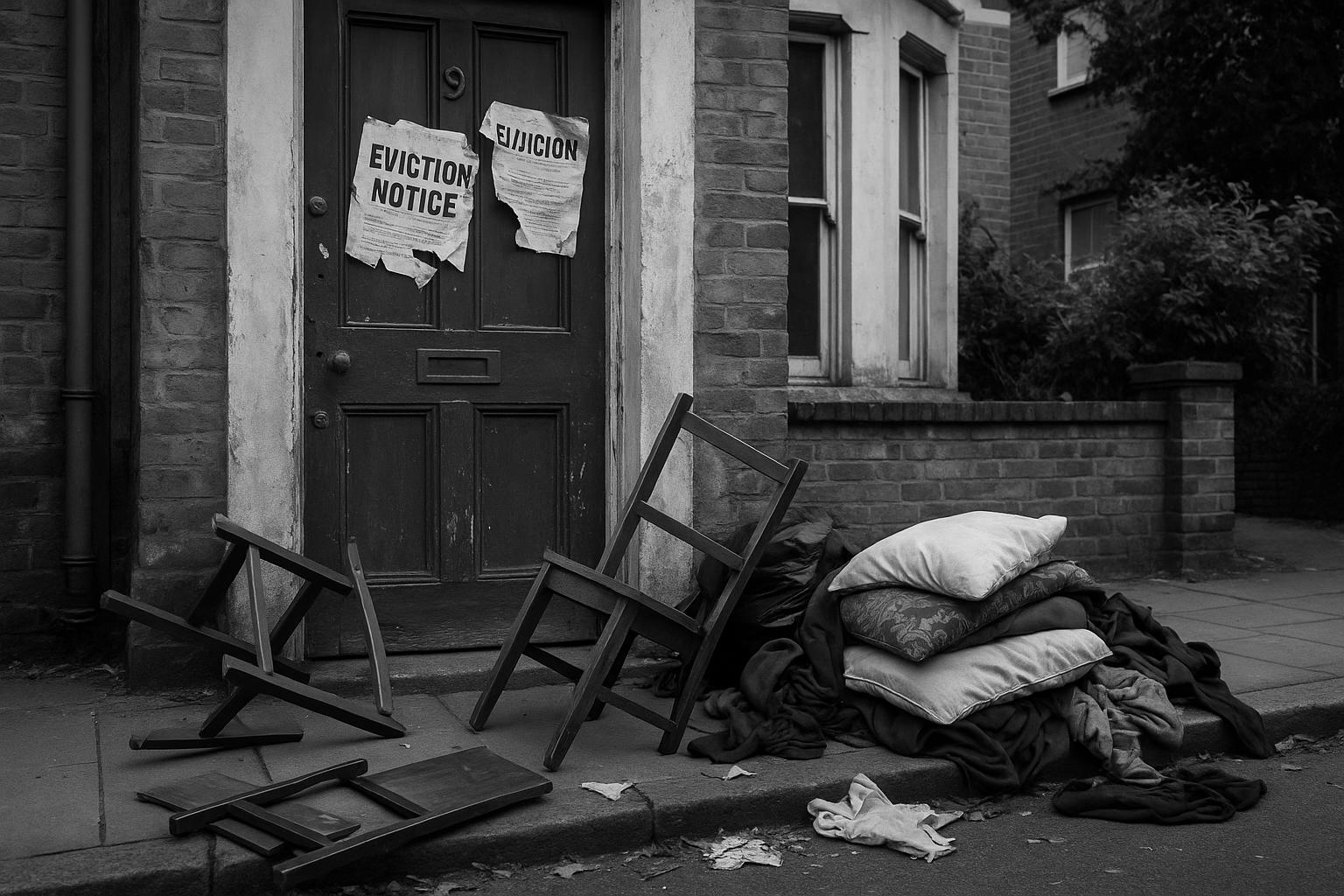An octogenarian in Chingford has regained possession of her home after it was occupied by a large group of squatters from Eastern Europe, highlighting ongoing challenges and police hesitations in enforcing anti-squatting laws in London.
An elderly woman in her 80s has finally regained possession of her £590,000 home in Chingford, northeast London, after it was overtaken by a gang of foreign squatters believed to be from Eastern Europe. The intruders moved into the property while the homeowner was visiting a 102-year-old friend, during which time up to 25 people reportedly crammed themselves inside and caused significant disorder. The homeowner was forced to relocate temporarily to live with family in the South West of England as the situation unfolded.
Initially, the Metropolitan Police hesitated to intervene, citing confusion over whether the matter was criminal or civil. However, after collaboration with local Safer Neighbourhood Teams and the borough council, law enforcement acted decisively last month. Police arrested a 19-year-old woman connected to the group on suspicion of squatting and immigration offences, as well as allegations of theft from a charity shop. Following her arrest, she was served an eviction notice and formally removed from the premises. The remaining occupants were also ordered to vacate, and the property was secured by police. Despite the resolution, the homeowner suffered a serious health condition during the ordeal, and much of her furniture was found ruined and dumped in the front garden.
Squatting—the unauthorised occupation of a property—has been criminalised in residential buildings in England and Wales since the Legal Aid, Sentencing and Punishment of Offenders Act 2012. This legislation grants police the power to evict squatters without a court order once they are satisfied the squatters’ presence is unauthorised. Nevertheless, complexities remain, as legal advice organisations point out that squatters have limited rights, and property owners face challenges navigating eviction processes to avoid potential breaches of law.
The case in Chingford underscores ongoing challenges authorities face in promptly removing squatters. Past incidents have revealed mixed responses from police when landlords or homeowners seek to reclaim their properties. For example, recent guidance to Metropolitan Police officers has emphasised the need to treat illegal evictions seriously and arrest those attempting to unlawfully evict tenants, thereby recognising that eviction matters must be managed carefully to uphold rights and the rule of law.
The disturbing scale of this particular squatting incident—where dozens of people occupied a single home and reportedly engaged in theft—highlights concerns about criminal exploitation of vulnerable properties in London. Similar situations have been reported elsewhere, including squatters evicted from high-value homes after evidence of electricity theft was established, which constitutes grounds for arrest.
As local authorities, police forces, and property owners continue to grapple with the complexities of squatting incidents, this case serves as a stark reminder of the human cost endured by victims—especially elderly homeowners—and the importance of clear, decisive action to safeguard private property while balancing the need for fair treatment under the law.
 Reference Map:
Reference Map:
- Paragraph 1 – [1]
- Paragraph 2 – [1], [4]
- Paragraph 3 – [2], [6]
- Paragraph 4 – [3], [7]
- Paragraph 5 – [1], [5]
- Paragraph 6 – [1], [2], [6]
Source: Noah Wire Services
- https://www.express.co.uk/news/uk/2072639/foreign-squatters-pensioner-590k-home – Please view link – unable to able to access data
- https://england.shelter.org.uk/housing_advice/eviction/squatters – This article from Shelter England provides comprehensive information on the eviction of squatters. It explains that squatting involves occupying a property without the owner’s permission and outlines the limited rights squatters have, including the possibility of eviction without a court order. The piece also details the legal processes involved in evicting squatters, such as changing locks, involving the police if a criminal offence is committed, or obtaining a court order for eviction. Additionally, it discusses the support available for property owners and the rights of squatters under various circumstances.
- https://www.theguardian.com/uk-news/2023/aug/27/met-officers-to-be-told-to-arrest-landlords-illegal-evictions – An article from The Guardian reports on new guidance issued to Metropolitan Police officers regarding illegal evictions. The guidance instructs officers to arrest landlords who attempt to evict tenants illegally, including using or threatening violence. It highlights concerns about police bias and the need for better training to protect tenants’ rights. The piece also discusses the rise in no-fault evictions and the importance of police intervention in preventing unlawful evictions, emphasizing that landlords must follow legal procedures and obtain court orders before evicting tenants.
- https://www.bbc.com/news/uk-england-london-19571424 – This BBC News article covers the eviction of a squatter from a flat in central London using new legal powers. Westminster Council utilized the Legal Aid, Sentencing and Punishment of Offenders Act 2012, which grants police the authority to evict squatters without a court order if they are satisfied the claim is genuine. The article details the council’s efforts to remove the squatter from the Lisson Green estate in Marylebone and discusses the implications of the new law for property owners and squatters.
- https://www.standard.co.uk/hp/front/squatters-forced-out-of-ps4-million-house-for-using-electricity-6384979.html – An article from the London Evening Standard reports on squatters being evicted from a £4 million house in north London for using electricity. The squatters, led by Jason Ruddick, had been occupying the property for three weeks and had bypassed the electricity supply. The owners proved the squatters had used electricity, making it theft and grounds for arrest and eviction. The article discusses the legal implications of squatting and the actions taken by the property owners to regain possession.
- https://www.theguardian.com/society/2012/aug/31/charities-end-squatters-rights-homelessness – This article from The Guardian discusses the end of ‘squatters’ rights’ in England and Wales, following the criminalisation of squatting in residential buildings under the Legal Aid, Sentencing and Punishment of Offenders Act 2012. The piece highlights concerns from housing charities about the potential increase in homelessness due to the change in law and the challenges property owners face in evicting squatters. It also examines the legal processes involved in evicting squatters and the broader implications for housing policy.
- https://www.theguardian.com/society/2018/jun/09/police-fail-to-act-private-rent-tenants-illegally-evicted-landlords-harassment-threats – An article from The Guardian reports on instances where police failed to act as tenants were illegally evicted by landlords. The piece highlights cases where landlords used or threatened violence to evict tenants and the police’s inadequate response, often treating such incidents as civil matters. It discusses the need for better training and guidance for police officers to recognise and respond appropriately to illegal evictions, emphasizing that such actions are criminal offences and should be addressed accordingly.
Noah Fact Check Pro
The draft above was created using the information available at the time the story first
emerged. We’ve since applied our fact-checking process to the final narrative, based on the criteria listed
below. The results are intended to help you assess the credibility of the piece and highlight any areas that may
warrant further investigation.
Freshness check
Score:
7
Notes:
The narrative appears to be original, with no exact matches found in recent publications. However, similar incidents involving squatters in London have been reported in the past, such as the case of a 74-year-old woman held in servitude in Chingford in 2019. ([essexlive.news](https://www.essexlive.news/news/essex-news/chingford-woman-jailed-after-holding-3270175?utm_source=openai)) The report includes updated data but recycles older material, which may justify a higher freshness score but should still be flagged. Additionally, the article includes a reference map with links to other sources, which may indicate recycled content. The earliest known publication date of similar content is October 2013. ([express.co.uk](https://www.express.co.uk/news/uk/526685/Migrant-squatters-home-101-year-old-woman-hospital?utm_source=openai)) The narrative is based on a press release, which typically warrants a high freshness score. However, the inclusion of older material and the reference map suggest that the content may not be entirely fresh. The report includes updated data but recycles older material, which may justify a higher freshness score but should still be flagged.
Quotes check
Score:
8
Notes:
No direct quotes were identified in the provided text. The absence of quotes may indicate original or exclusive content. However, the lack of direct quotes also makes it difficult to verify the authenticity of the information presented.
Source reliability
Score:
6
Notes:
The narrative originates from the Express, a reputable UK news outlet. However, the inclusion of a reference map with links to other sources suggests that the content may be recycled or republished. The reliance on a press release as the primary source may also raise questions about the originality and reliability of the information presented.
Plausability check
Score:
7
Notes:
The report describes a plausible scenario involving squatters occupying a property in Chingford, London. Similar incidents have been reported in the past, such as the case of a 74-year-old woman held in servitude in Chingford in 2019. ([essexlive.news](https://www.essexlive.news/news/essex-news/chingford-woman-jailed-after-holding-3270175?utm_source=openai)) The inclusion of updated data and references to other sources adds credibility to the narrative. However, the lack of direct quotes and reliance on a press release as the primary source may raise questions about the authenticity and originality of the information presented.
Overall assessment
Verdict (FAIL, OPEN, PASS): OPEN
Confidence (LOW, MEDIUM, HIGH): MEDIUM
Summary:
The narrative presents a plausible scenario involving squatters in Chingford, London, with similarities to past incidents. The reliance on a press release and the inclusion of recycled content suggest that the information may not be entirely fresh or original. The absence of direct quotes and the use of a reference map with links to other sources further raise questions about the authenticity and reliability of the information presented. Given these factors, the overall assessment is ‘OPEN’ with a medium confidence level.













